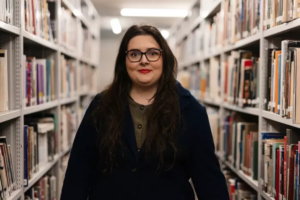- ...
Postgraduate Studentships - Search for funding opportunities.
Postgraduate Studentships - Search for funding opportunities.
Postgraduate students at this coastal uni have the space and support to delve into the subjects they’re passionate about – from ‘incel’ subculture to new styles of classroom learning.
Anisa Sultana | PhD in Education
“I have always been passionate about student engagement and transferable skills”.

A decade ago Anisa Sultana was living and working in London as a lecturer when she and a friend took a trip to explore the south coast. As the train drew into Portsmouth, she admired a striking building through the carriage window. “My friend said: ‘That’s the University of Portsmouth … who knows, maybe you’ll come here one day for your PhD?’ And that’s exactly what happened.”
Ten years after that first visit, Sultana is halfway through her doctoral studies at the university and, as she puts it, “really loving this island city” where she is pursuing her desire to transform her career as an academic. This time she’s accompanied by her husband and their children too.
After completing a master’s degree at Middlesex University, and gaining experience as a teacher in London’s higher education colleges, Sultana returned to her native Bangladesh, where she worked in higher education as an academic and researcher. But she still harboured an ambition to obtain a PhD, and when she found out that the University of Portsmouth was offering a research programme in her area of academic interest, she knew it was time to make a move. She applied, and opened the doors to the next stage of her career.
Her research explores how to co-design academic modules in partnership with academic staff, students, employers, alumni and other external partners. The idea is to improve students’ experience of study as well as their actual learning. “I have chosen this area because I have always been passionate about student engagement and transferable skills,” says Sultana, whose ambition is to become an academic expert in education design. “If designing courses in partnership works as it should, students become more engaged, more motivated, more skilled, more able to communicate effectively, and more able to share ideas. The aim is to transform life chances.”
Routes into PhD study
There are different routes to postgraduate study, some students will go straight from an undergraduate degree, while others might be switching careers. The University of Portsmouth’s professional doctorate courses are popular with senior nurses, police officers, teachers and others who wish to become leaders in their line of work by obtaining an applied doctorate. Others want to study a topic they’re interested in in greater depth, and these academic researchers find space to explore their interests at Portsmouth too.
Anda Iulia Solea | PhD in Criminal Justice
“I chose Portsmouth because of my supervisor – she’s an expert in incels”.

Anda Iulia Solea was attracted to Portsmouth because of the personalised support its supervisors offer. In particular, she wanted to start her research career under the guidance of Dr Lisa Sugiura, a reader in cybercrime and gender at the university, and an expert in online gender-based violence and incels.
Solea’s area of study could not be more current, dealing with the development of “incel” – involuntarily celibate – communities of men online, and the “manosphere”, which has allowed misogynists such as Andrew Tate to make a name for themselves on social media.
Solea, who enrolled on her PhD straight from master’s study – an MSc in social and organisational psychology at the University of Exeter – says: “I chose Portsmouth because of my supervisor – she’s an expert in incels. The project is partly funded and it matches my interests.”
She has been supported by the university to move her research goals as the extent of the influence of misogyny online began to reveal itself. “It’s an emerging subject, and until recently my project was looking just at incels, and how they share and construct their extremist ideology and rhetoric on fringe online platforms and forums. But as time went on I realised the influence of manosphere individuals who share their content in less extreme ways.
“Incels are pessimistic, criticised and ostracised online, and often labelled as extremists, which makes their ideology less likely to be adopted. The manosphere shares the same toxic ideology but the way it’s explained and portrayed to people makes it more digestible. And they have a wider reach, as key manosphere figures are popularised and plastered all over mainstream social media platforms such as TikTok and YouTube.”
She pivoted her research to reflect this change in significance. “The support I have received from my supervisor meant I got the chance to write a research paper addressing antisocial behaviour and toxic communication online, to be published in the European Journal of Criminal Policy and Research.” She would like her work to help to change policy around internet safety and gendered online harms.
She has also received dedicated funding via a prestigious research award from the Alan Turing Institute to learn more about using computers in her research to study social behaviour and language – a new skill for her, and one she believes will be important in her future research career. She describes the training and support from both inside and outside the university as “the perfect match” to her research subject and one that promotes development of academic, professional and personal skills.
Celebrating students research
Sultana and Solea will look to share their ideas at the university’s annual festival of research, which allows all researchers to share their excitement about their work and their findings with others across the range of disciplines covered by the institution.
“Research culture is partly about talking about your research to others and getting feedback on it and getting people excited about it,” says Dr Darren Van Laar, director of Portsmouth’s graduate school. “I’ve been very excited and inspired by our research students.”
He adds that beyond the academic opportunities, postgraduate students are attracted to the university because of the seaside culture of the campus. “Southsea, the area where the university is and where all the students live, has a really relaxed, villagey feel to it,” he says. Sea, sand and studies – what’s not to like?

Invest in yourself with a postgraduate degree at Portsmouth. 5 STAR Rating for Excellence (QS World University Rankings 2024) Top 3 Modern Universit...
Sign up to Postgraduate Studentships
Sign up to compare masters
Thanks for making your selection. Click below to view your comparisons.